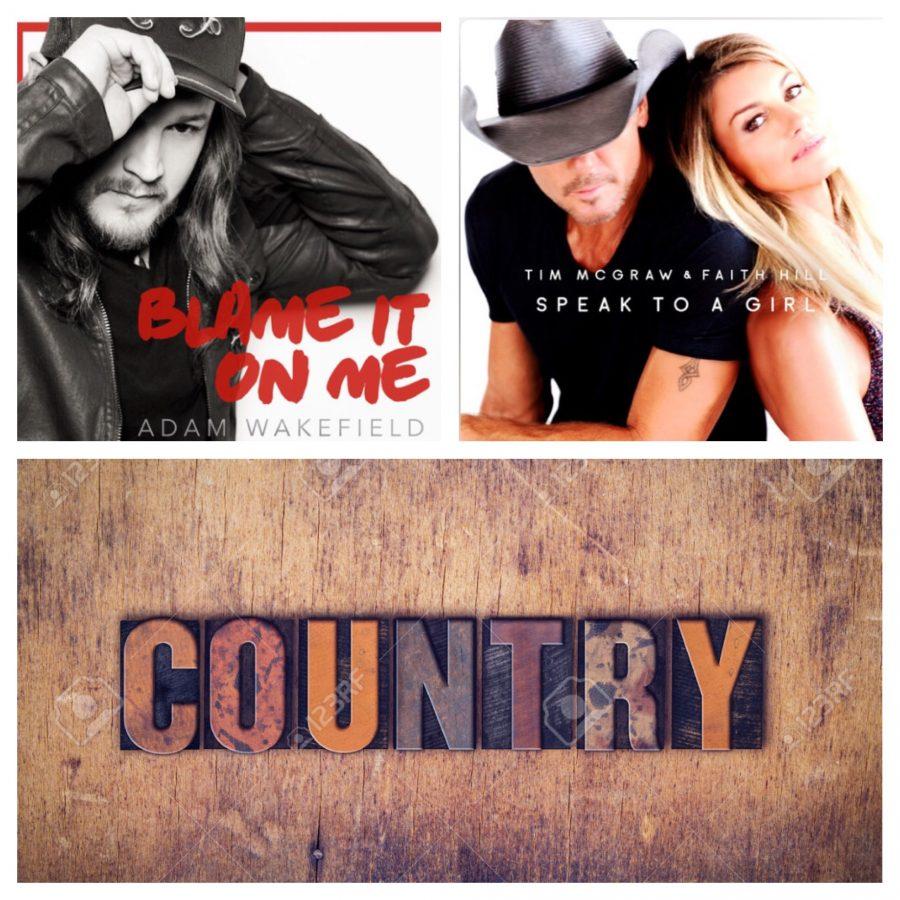3 Artists, 2 Singles, 1 Genre
Single reviews on Adam Wakefield, Tim McGraw, and Faith Churchill’s new country singles
College by Sam Bodnar; bottom photo courtesy of 123rf.com
Country artists Adam Wakefield, Tim McGraw, and Faith Churchill deliver with brand new singles that are climbing the iTunes charts and gaining popularity in Nashville.
In the blink of an eye, three country artists have released two stellar singles that are climbing the charts and causing hype in the country community. While these singles are completely different, both present listeners with diverse sounds and unique instrumentals.
Nashville native and runner-up on “The Voice,” Adam Wakefield, has now released two singles to iTunes and Spotify since his time on the show ended. His first release, “When You’re Sober,” was a peaceful, piano piece that I reviewed a few months back. Now, Wakefield has produced another quality single that is nothing less than his best.
“Blame it on Me” was released on March 24 and came with the help of Wakefield’s friend, Nolan Neal, who appeared on “The Voice” last season. Combined with Neal’s pop influence and Wakefield’s country and southern rock style, these two artists created the ultimate rock ‘n’ roll country song.
Bluesy chords on an electric guitar start small and soon explode into a blend of country, pop, and rock ‘n’ roll. Wakefield’s lower register in the first verse introduces the desire to end a conflict between a couple and with the beat of a drum, his voice lights up in the chorus.
Lyrics, “Blame it on me if it makes you feel better/ Say I’m the reason that we couldn’t stay together/ It’s my fault/ Say it’s all my fault,” exert the first signs of power and soul in Wakefield’s voice that immediately feel support from the thundering of drums and the echoing of background vocals.
Following the first chorus, the electric guitar becomes isolated and continues to deliver the mood of the song into the second verse. Here, Wakefield expresses that he is tired of doing things that he knows he’ll regret. The middle of his register takes liberties to emphasize words like “regret” and “things you can’t forget” while the music slows down behind him. This underscores the sorrow of his overall message and essentially helps the music behind him amp up the rhythm into the next chorus.
Following the second chorus, Wakefield interjects his falsetto which carries a culmination of rock and country. On-again, off-again tempo changes as the drums carry him into the final minute of the song as his vocal power and belt go on full display. The final 60 seconds are also particularly interesting because the background vocals fade in and out with the guitar solos while Wakefield sings, “Blame it on me if it makes you feel right/ Say I’m the reason that you can’t sleep at night.” The pop-like riffs that he floats once again showcase Neal’s influence and give listeners another side of Wakefield that he hadn’t really found before. As the guitar and chorus fade out to finish the single, Wakefield growls the title lyrics, and caps it all off with the lowest section of his vocal range.
___________________________________________________________________________
The second country single released within the previous week was Tim McGraw and Faith Churchill’s “Speak to a Girl.” Because both artists are completely tied to the country genre this is a significantly different single than Wakefield’s.
Churchill opens the song backed by a harmonious acoustic guitar and a peaceful, steady tapping on the drums. As the first verse develops, an electric guitar edges its way into the melody as Churchill sings about how a woman values a loving man who will respect her rather than a rich man who would lean on what his money provides.
While the chorus introduces a violin that really provides beauty and elegance, it lacks the enthusiastic spunk that country songs typically have. Additionally, unlike Wakefield’s chorus, the instrumentals barely reflect an increase in energy, which makes it a little too bland. Churchill’s vocals also provide no variation in tone or power, but McGraw picks up the pace.
McGraw’s tone and round vowels echo along with an increasing drum tempo that brings forth a ton of life into the song. As he sings, “She don’t need to hear she’s a queen/ On a throne, that she’s more than amazin’,” the electric guitar comes to life and slowly takes over for the acoustic. His refreshing and soulful vocals transition into the second chorus where Churchill joins to back him up.
Together, their voices and the orchestration give birth to an open and stripped down environment. Churchill takes the harmonies and dances around the melody which McGraw’s upper register carries. His riffs and low-powered growls complement Churchill’s soft vocals as they sing about how a man shouldn’t objectify a woman.
The country duo also switches places in the final chorus to add a pleasant and surprising twist to the duet. Churchill takes the harmony and interjects power in the final 30 seconds, while McGraw steps back to take control of the song’s melody.
Despite their slow beginning in the duet, “Speak to a Girl” was a pleasant preview of what’s to come from McGraw and Churchill. The country duo intends to release a debut album filled with duets, and this preview leaves me excited to hear more.

Sam Bodnar is a senior and the original founder of the Sage Creek journalism publication program. He created the first paper, The Sage Creek Times, with...


